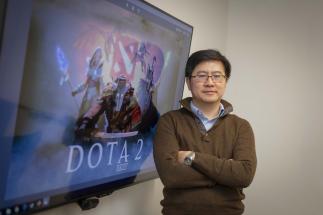Kenny Ching was once good enough at gaming that during college he considered going pro.
Briefly.
“There’s no way my parents would have allowed it,” Ching says with a laugh.
Gaming activity is up in the United States during the novel coronavirus pandemic, and the World Health Organization has even thrown its support behind a gaming industry initiative called #PlayApartTogether. But for Ching, now an assistant professor of entrepreneurship at WPI’s Business School, gaming is mostly a source of scholarship. Although he still games during his spare time, he has also found a novel use for the data generated by his hobby—to study teamwork.
The subject of teamwork is important because project work is changing the way organizations manage workers and critical situations. In addition, teams are everywhere, from hospital emergency departments to businesses.
Working with researchers in London and Minnesota, Ching has used data from 6.4 million matches of the online battle arena game Dota2 to study how teams of specialists, individuals with specific skills or expertise, perform compared to teams of generalists who possess broad expertise.
The way gamers come together quickly to fight battles may seem an unusual subject for study, but Ching believes that gaming can help illuminate how teams of specialists and teams of generalists coordinate their efforts and adapt to changing circumstances. Those changes could include the new rules of operating under a pandemic.
“In the economy that we’re transitioning toward, as we adapt to a new world of social distancing, organizations frequently have to put teams together on the fly,” says Ching. “Hence it’s more important than ever that we understand how to make these temporary teams, which might be composed of strangers, perform better.”
